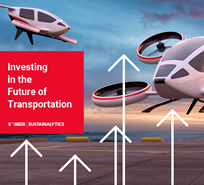The Raw Materials Crunch: Industry Risks Due to Physical Scarcity, Supply Concentration and Intense Demand
As demand for critical raw materials increases, due in part to the low-carbon transition, industries reliant on those materials face growing risks. In this article, discover what’s driving those risks.
Investors Seek Meaningful Scope 3 Emissions Targets to Evaluate Climate Transition Plans
Climate concerns continued to dominate proxy voting in the 2022 proxy season. With more clarity on sectoral commitments required to achieve the global net zero goal, shareholders’ requests have become noticeably more specific. A larger number of resolutions asked companies to adopt and report on emissions reduction targets and transition plans that reference the latest forward-looking guidance.
Danish Delegation Engages Sustainalytics’ Biodiversity Expert, Enabling Front Row Access to COP15 Negotiations
Finance Day within the U.N. Biodiversity Conference (COP15) is fast approaching, and Morningstar Sustainalytics’ team members will be in attendance, each focusing on different investor biodiversity considerations related to active ownership.
The Role of Sustainable Aviation Fuel in Achieving Decarbonization by 2050
Meeting the aviation's industry's goal of decarbonization by 2050 will require a collective effort and more ambitious measures than those currently in place, including carbon offsetting, route optimization, fuel efficiency and fleet renewals that involve a shift to more eco-friendly aircraft. However, all of these measures still revolve around fossil fuels as a source of energy.
Telecom Network Outages, the ESG Risks of a Connected World
The telecom industry is exposed to several Material ESG Issues, including Data Privacy and Security, Business Ethics, Human Capital and Product Governance. Product Governance issues in the telecom industry include service quality, maintaining reliable, high-speed networks, and responding to customer billing concerns.
ESG Risks Affecting Data Centers: Why Water Resource Use Matters to Investors
Data centers play a critical role for many technology and telecom companies and for their supporting servers, digital storage equipment and network infrastructure for data processing and storage. Data centers require high volumes of water directly for cooling purposes and indirectly, through electricity generation. Morningstar Sustainalytics’ recent activation of the Resource Use Material ESG Issue (MEI) within its ESG Risk Ratings recognizes water risks of data centers.
Why ESG Investors Follow the Elon Musk Twitter Takeover
A self-proclaimed “free speech absolutist”, Musk has criticized what he views as excessive moderation on online platforms, indicating his desire to ease Twitter’s content moderation policies and only remove content deemed illegal by governments.
Cobalt ESG Risks Threaten Electric Vehicle Supply Chain
Transport electrification is at the forefront of the international climate transition agenda. Because of this, global demand for cobalt is projected to grow fourfold by 2030, which raises the question, are mineral supply chains robust enough to fuel a sustainable EV revolution?
ESG Implications of Russia’s Invasion of Ukraine on the Automotive Industry
The Russia-Ukraine conflict has put more pressure on a sector that was already constrained by the disrupted supply chains, brought about by pandemic-induced congestions and shortages. Additionally, the surge in fuel price is already affecting customers, although it may accelerate the adoption of electric vehicles (EVs) as a side effect. However, the scarcity of minerals, which are necessary for semiconductor manufacturing, may further exacerbate the chip shortage that has afflicted the automotive industry since 2020.
Russia-Ukraine Crisis Could Spell Unforeseen ESG Risks for Insurers
The Russia-Ukraine conflict and the subsequent sanctions on Russian entities have led to material and wide-ranging impacts on diversified sectors and international firms. However, company disclosures and other sources suggest that the conflict’s primary impact on the global insurance industry is limited for two main reasons
ESG Implications of Russia’s Invasion of Ukraine on the Aviation and Defense Sectors
The aviation industry is feeling the impact of rising fuel costs as an immediate repercussion of the conflict in Ukraine. In particular, the airline sector is still facing significant challenges in mounting a steady recovery from the COVID-19 crisis. On the other hand, the defense industry may be presented with opportunities in light of increased government spending in the aftermath of the invasion.
Leveraging Blockchain to Improve Supply Chain Management - A Case Study for Household and Personal Products Companies
With growing scrutiny from stakeholders—international regulators and regional governments, NGOs, the general public, investors, and financial institutions—companies accused of human rights violations and environmental damage in their supply chains face substantial risks.
ESG Impacts of the War in Ukraine: Global Food Supply
The invasion of Ukraine highlights the fragility of the global food system. The destruction caused by the war and subsequent trade restrictions on Russia, endangers a significant percentage of the global food supply coming from two of world’s leading agricultural commodity exporters, consequently prompting food prices to surpass the 30-year high.
ESG Benchmarking: Helping Asia Pacific companies excel their sustainability performance
Hear from a panel of ESG thought leaders, sharing their insights on how Sustainalytics ESG Benchmarking Solutions supported them understanding its ESG position among industry peers, identifying gaps and communicating sustainability accomplishments to key stakeholders.




















-(1200-x-600-px)-(5).tmb-thumbnl_rc.png?Culture=en&sfvrsn=e57ab91e_4)